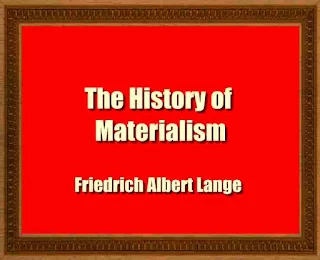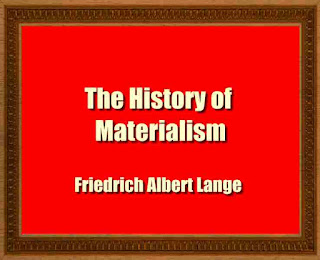The History of Materialism Authorised Translation from German by Ernest C. Thomas. This is a work that has long and impatiently been expecte...
The History of Materialism
Authorised Translation from German by Ernest C. Thomas.
This is a work that has long and impatiently been expected by a large circle of readers. It has been well praised by two eminent scientists, and their words have created for it, as regards its appearance in our English tongue, a sort of ante-natal reputation.
The reputation is in many respects well deserved. The book is marked throughout by singular ability, abounds in striking and suggestive reflections, subtle and profound discussions, felicitous and graphic descriptions of mental and social movements, both in themselves and m their mutual relations.
Materialism as a theory of the nature of the world has had a curious history. Arising almost at the beginning of Greek philosophy, it has persisted down to our own time, in spite of the fact that very few eminent philosophers have advocated it. It has been associated with many scientific advances and has seemed, in certain epochs, almost synonymous with a scientific outlook.
Accusations of materialism have always been brought by the orthodox against their opponents, with the result that the less discriminating opponents have adopted materialism because they believed it to be an essential part of their opposition. At the present moment, the official creed of one of the largest States in the world is materialism, although hardly anyone in the learned world explicitly adheres to this theory,
A system of thought which has such persistent vitality must be worth studying, in spite of the professional contempt which is poured on it by most professors of metaphysics. Lange's History of MaterMis'm, here re-issued in ‘‘ The International Library of Psychology, Philosophy, and Scientific Method,” is a monumental work, of the highest value to all who wish to know what has been said by advocates of materialism, and why philosophers have in the main remained unconvinced. The first edition appeared in 1865
It is commonplace to object to materialism on ethical grounds since it is supposed to have a deleterious effect on conduct. While energetically repelling many forms of this criticism, Lange universities uphold it in the end, since he regards the economics of the Manchester school and the ruthlessness of modern competition as attributable to a materialistic outlook.
This is perhaps the weakest part of his book, in spite of the fact that unlike most Gutman learned men, he had considerable experience of practical life. In 1861, at the age of 33, he resigned his position as a teacher and became secretary of the Duisburg Chamber of Commerce. But his position became difficult owing to his radical opinions, which found v<uit in various directions.
He edited a newspaper called Tin- Rhine, and Ruhr Gazette. and he wrote a book called Die Arheiterfrage in ihrer Bedeutung fiir Gegentvart und ZukunfL which appeared in the same year as his History of Materialism. His industry was a little short of miraculous, for in this same year he published yet another book, Die Grmidlefpjng der mathematischen Psychohgie —and all this without neglecting the newspaper or the Chamber of Commerce. In the following year (1866) he went to Switzerland, where he again took up academic work, becoming Professor at Zurich in 1870, and returning to Germany in 1872 as Professor at Marburg. But his expc^riences in the world of industry and commercti undoubtedly helped to widen his outlook and to give him an understanding, not always possessed by the learned, of the operation of theories when they pass out into the marketplace.
He remarks that, in England, philosophers are often statesmen, and, what is still more extraordinary, statesmen are sometimes philosophers. He does not point out how often the mixture is damaging to both, making the statesman too theoretical and the philosopher too pn'.ctical. Lange’s book is divided into two parts, one dealing with the times before Kant, the other with Kant and his successors.
This division shows the very great importance which he attaches to the philosopher of Konigsberg—importance which, perhaps, may seem less as time goes on. Kant’s system is intimately bound up with the state of the exact sciences in his day: Euclidean geometry gives the foundation of the transcendental aesthetic, and the .4ristotelian syllogism gives the ground for the deduction of the categories. Now that geometry has become non-Euclidean and logic non-Aristotelian, Kant’s arguments require a restatement; to what extent this is possible, is still a moot question.
To the present writer, the first half of Lange’s book appears considerably better than the second, because it is less affected by the author’s views on matters which are still undecided. In the periods before Kant, his critical judgment is extraordinarily solid.
The account of Greek atomism, the analysis of Plato’s influence for good and evil, are admirable. The combination of scientific material¬ ism with theological orthodoxy in seventeenth-century England, and its contrast with the revolutionary materialism of eighteenth-century France, are set forth with a nice historical sense. But it is always a very difficult task to see one’s own time from a historical perspective. Apart from philosophical predilections, there is difficulty in disentang¬ ling what is important and permanent in the purely scientific work of one’s own generation.
The problems which occupied the men of science sixty years ago were very different from those of the present day. and it was impossible to know which of them would prove to be historically important. On the question: what is tine and what false in materialism? it is possible to speak with more learning and more complication than in former days, but it may be doubted whether any substantially new arguments have been invented since Greek times.
Nevertheless, it may be profitable to attempt a survey of the position as it appears in the light of modern science.
the book details : Download 90 MB - PDF ebook. Read on PC for the best experience.










